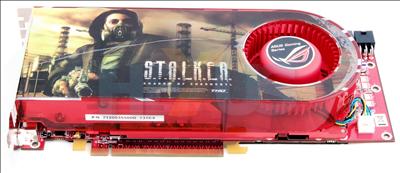ASUS EAH2900XT appearance and thoughts
ASUS, predictably, makes use of the reference card for its Radeon HD 2900 XT. The HSF's sticker/plate is the only meaningful method of discerning this R600 from any other partner's reference-based effort.
The semi-side-on shot reinforces the size of the card. It uses a double-slot cooler that keeps the ~700M transistors humming along at a reasonable load temperature.
We still observed the frequent modulation of fan-pitch when the card was subject to continuous 3D load, just like the initial reference model, and it's this modulation that causes the most aural irritation.
NVIDIA's GeForce 8800 Ultra's cooler, on the other hand, is significantly quieter when placed under identical load.
Very high-end single-chip GPU design is such that power requirements can scale to over 200W. Overclocking will push that figure upwards, obviously, and AMD's designed the Radeon HD 2900 XT to take advantage of both 6-pin (75W) and 8-pin (150W) power connectors. Now, considering that the PCIe x16 slot provides 75W, a total peak load of 300W is catered for.
We encountered no stability-related problems when running with 2 six-pin PCIe connectors, so it's a case of AMD, and by extension ASUS, playing the power game safe.
Bear in mind that if you're upgrading your PCIe graphics card from a low-power model and use, say, a 400W PSU, a change in supply may be necessary to keep the R600's power thirst sated. That goes, well, double for a CrossFire multi-GPU setup.
A look at the back highlights a couple of dual-link DVI ports that support dual-link HDCP. The mini-DIN socket relays the card's basic analogue VIVO capabilities.
Brief summary
A bog-standard Radeon HD 2900 XT card that is, unsurprisingly, clocked in at reference speeds of 743/743/1656MHz for the core, shader and memory clocks, respectively.Differentiation will be based upon price, bundle and warranty...













